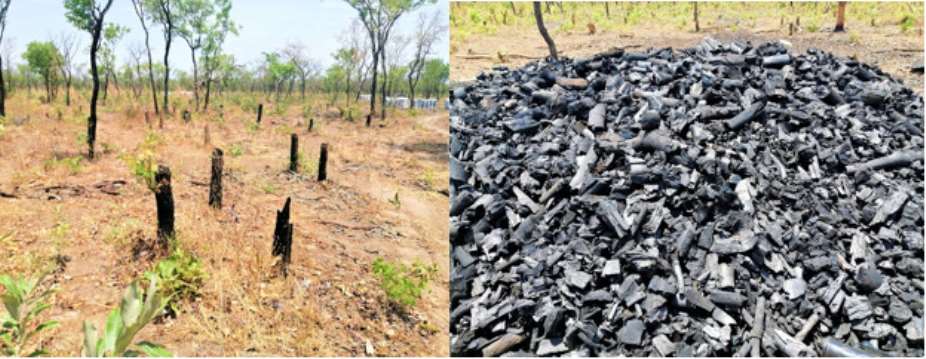Regions in Northern Ghana according to the Ghana Statistical Service (2015) are the poorest regions in Ghana. In fact, the Upper West Region has the highest poverty level in Ghana, with 70.7 percent of the population living below the poverty line in 2013 (Ghana Statistical Service 2014).
Moreover, households in northern Ghana are among the least food secure and suffer from chronic health problems related to nutrition deficiencies.
There are varied reasons for Ghana’s slow progress in combating poverty but the overly dependence on agriculture as a key driver is a major factor. Agriculture is the main livelihood in the north and most of the agriculture is dependent on rainfall during the one wet season.
Without irrigation, or other water management practices, there is only one production season; dry season agriculture activities are limited. The seasonality and variability of rainfall, coupled with poor soils, frequent outbreak of diseases and pests, poor farm input supplies among others make the agricultural sector to underperform.
As a result, in many parts of the north there is dry season out-migration, especially for working age men who move to central and southern Ghana seeking employment in the mining and agricultural plantation sectors. There is also a flow of women migrants to the more urban areas where they engage mainly in kayayoo (head portage).
Mention must also be made of the role of climate change in the fight against poverty. The general decrease in the amount of rainfall, frequency and variability over the decades have played a major role in limiting the development of agriculture in northern Ghana. Frequent droughts and floods reduce the resilience of the local people and their ability to cope with climate change effects.
Rural households in northern Ghana have a lot of alternative ways of meeting their household food needs during the lean season. During this period, households who run out of food rely on fruits, vegetables and income from the sale of such fruits and vegetables for their survival.
Despite the huge benefits that trees such as the shea tree offered the people, there has been a growing commercial charcoal production in northern Ghana in the past few years than ever before in this has left many areas fast developing into a desert!
The shea tree which provides both fruits and income to many vulnerable homes had become the main target besides rosewood as it charcoals has high demand in the market. On a daily basis, long vehicles are seen transporting charcoal in large quantities from the north to southern Ghana. These vehicles pass through various police checkpoints to their destinations.

The mass cutting down of trees for charcoal production together with rosewood logging, bush burning, and other environmentally unhealthy practices is not only increasing climate change but continued food insecurity, poverty, hunger and diseases in the area.
Ghana cannot stop the production of charcoal in the next 10 to 20 years. However, the country can control how charcoal are being produced especially producing for export. A political will is needed not to only stop illegal mining but other activities that destroy our natural environment.
Therefore, regional ministers. Municipal and District Chief Executives, Assembly Members, Traditional and Religious Authorities, the Civil Society Organizations, the Security Forces and other relevant bodies need to take action now before northern Ghana becomes the Sahara Desert.
A good starting example is the Member of Parliament for Wa West, Hon. Peter Lanchene Toobu who has called for a stop to rosewood logging in his constituency and call on the youth and chiefs to join hands to chase out such environmentally unfriendly activities in the area considered as the poorest district in the whole of Ghana. Other MPs, ministers, and MDCEs should join the ques with policies aimed at ending the mass massacre of trees in these vulnerable areas.
The writer is a Green Ambassador for the Climate in Africa-CCAO-2020 and a Communication for Development practitioner.
Email: [email protected]





 2024 election will be decided on the grounds of the economy; choice of running m...
2024 election will be decided on the grounds of the economy; choice of running m...
 Dumsor: We're demanding less; just give us a timetable — Kwesi Pratt to ECG
Dumsor: We're demanding less; just give us a timetable — Kwesi Pratt to ECG
 Do I have to apologise for doing my security work, I won’t – Simon Osei-Mensah r...
Do I have to apologise for doing my security work, I won’t – Simon Osei-Mensah r...
 Prestea and Bogoso mines: Complete payment of outstanding salaries not later tha...
Prestea and Bogoso mines: Complete payment of outstanding salaries not later tha...
 NDC postpones Prof. Opoku-Agyemang entry tour to May
NDC postpones Prof. Opoku-Agyemang entry tour to May
 All my businesses have collapsed under Akufo-Addo — NDC Central regional chair
All my businesses have collapsed under Akufo-Addo — NDC Central regional chair
 Military, Prison Officers clash in Bawku, three injured
Military, Prison Officers clash in Bawku, three injured
 GRA-SML contract: MFWA files RTI request demanding KPMG report
GRA-SML contract: MFWA files RTI request demanding KPMG report
 Court threatens to call second accused to testify if NDC's Ofosu Ampofo fails to...
Court threatens to call second accused to testify if NDC's Ofosu Ampofo fails to...
 Family accuses hospital of medical negligence, extortion in death of 17-year-old...
Family accuses hospital of medical negligence, extortion in death of 17-year-old...
